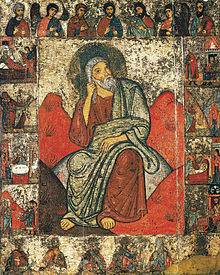Elijah (prophet)
| Elijah (Elias) | |
|---|---|
|
An icon of Elijah from Saint Catherine's Monastery, Mount Sinai.
|
| Elijah (Elias) | |
|---|---|

|
|
| Prophet | |
| Venerated in |
Judaism Christianity Islam Baha'i Faith |
| Feast | July 20 |
| Attributes |
prophet, wonder-worker |
| Patronage | Bosnia and Herzegovina |
Elijah (Hebrew: אֱלִיָּהוּ, Eliyahu, meaning "My God is Yahu/Jah") or Elias (/ᵻˈlaɪ.əs/; Greek: Ηλίας Elías; Syriac: ܐܸܠܝܼܵܐ Elyāe; Arabic: إلياس or إليا, Ilyās or Ilyā) was a prophet and a miracle worker who lived in the northern kingdom of Israel during the reign of Ahab (9th century BC), according to the Books of Kings in the Hebrew Bible. In 1 Kings 18, Elijah defended the worship of Yahweh over that of the Canaanite deity Baal. Yahweh also performed many miracles through Elijah, including resurrection (raising the dead), bringing fire down from the sky, and entering Heaven alive "by a whirlwind". He is also portrayed as leading a school of prophets known as "the sons of the prophets". After his death, Elisha his disciple and most devoted assistant took over his role as leader of this school. The Book of Malachi prophesies Elijah's return "before the coming of the great and terrible day of Yahweh", making him a harbinger of the Messiah and of the eschaton in various faiths that revere the Hebrew Bible. References to Elijah appear in Ecclesiasticus, the New Testament, the Mishnah and Talmud, the Quran, the Book of Mormon, the Doctrine and Covenants, and Bahá'í writings.
...
Wikipedia
